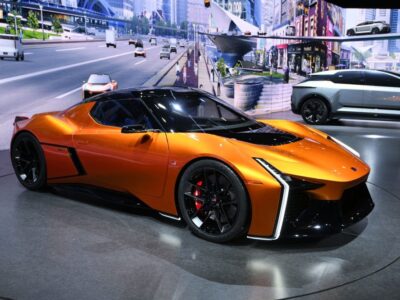Coinciding with major electric vehicle (EV) developments at CES 2023, Las Vegas is experimenting with a new type of EV car sharing. Halo.Car is unique because it’s pushing for a “driverless” car rental service. Are you slightly confused about how it can be driverless? As the iconic Bryson Tiller song goes, “Let me explain.”
Halo.Car is a service that allows customers to rent EVs, Kias and Bolts, on an app and have them delivered to a location. Once done, the customer can leave the vehicle where it is, and the company will pick it up. What makes this so innovative is that the business wants to take it a step further and is testing operating electric cars remotely without physical drivers in the vehicles during delivery and pick-up.
Sensor data is sent to the company headquarters, helping remote piloting drivers avoid hazards. A video feed shows the area around the EVs, and drivers guide them as if playing a racing simulator video game.
Once someone’s ride arrives at the pick-up location, the customer takes control of the vehicle. Upon completion of the trip, the remote drivers resume control of the car and head to their next destination.

Photo Courtesy Halo.Car
Rolling Out The Innovation
Halo has a four-step strategy to get up and running at full throttle. It starts with delivering EVs by a manual driver, which is currently available. The second step involves deliveries of the vehicles remotely, with a safety driver inside. Third, it will drop off vehicles remotely, followed by a chase car, and finally, move to fully remote drivers without chase cars or safety drivers.
“We see the four-step process being important to launching the first city while gaining considerable learnings from it, said Anand Nandakumar, founder and CEO of Halo.Car. “It’s an act of balancing risk management with speed and revenue.”
The company has been testing remote piloting with safety drivers in designated parts of Las Vegas. The public driverless test drive program began in early January, with a chase car following behind the Kias, monitoring how the pilots were performing.
VIDEO: Halo.Car’s driverless Kia
Making Safety Central
The goal is to ease apprehension over autonomous driving. It can be a reliable form of transportation, but it’s not without risk. Therefore, Halo.Car ensured vehicles can still be manually controlled, with an advanced safe stop mechanism. That eliminates the risk of the remote operator getting into a collision. It’s also how the car-sharing firm stands out from similar services like Waymo or Motional.
“Safety is of the utmost importance, which is why we use human drivers rather than autonomous technology,” said Nandakumar. Remote-control drivers can start and stop the car whenever they need to.
To drive the vehicles, signals are sent across T-Mobile’s 5G network in tested areas of Las Vegas. While coverage doesn’t extend everywhere, Halo has a plan for that. They can also use mid-to-low band 5G and LTE. The company also says it uses multiple networks — T-Mobile, AT&T, and Verizon — for added coverage. 5G isn’t up to scale to support this much bespoke technology. Even so, there are promising signs.
“We use 5G to bring an all-electric driverless car to wherever you are, and then we just let you drive the car once it gets there,” Nandakumar said. “The way we operate our cars is by having multiple cameras that are integrated into the vehicle, real-time streamed to our remote pilot.”

Photo Courtesy Halo.Car
Creating A Buzz
While Halo didn’t exhibit at CES 2023, it was able to provide demonstrations to attendees, generating serious buzz from car enthusiasts. The company hopes all this exposure will persuade people to use EV rentals over gas power to reduce emissions. It’s also a good way for potential buyers to test out an EV without buying one. There’s also much less financial risk involved in renting one of Halo.Car’s vehicles for a day or two.
One way Halo.Car will attract customers is its cost. The company charges a flat rental rate of $10 per hour or $80 per day, plus a $20 delivery fee. The service is innovative, good for the planet, and cheaper than traditional rental options.
Though more testing needs to be done, Halo.Car is setting a new standard for autonomous mobility. It may be a few years before the piloted EV fleet is at the level of Lyft or Uber, but initial tests have shown a lot of promise. Only time will tell if Halo.Car becomes a more mainstream mode of car sharing.





